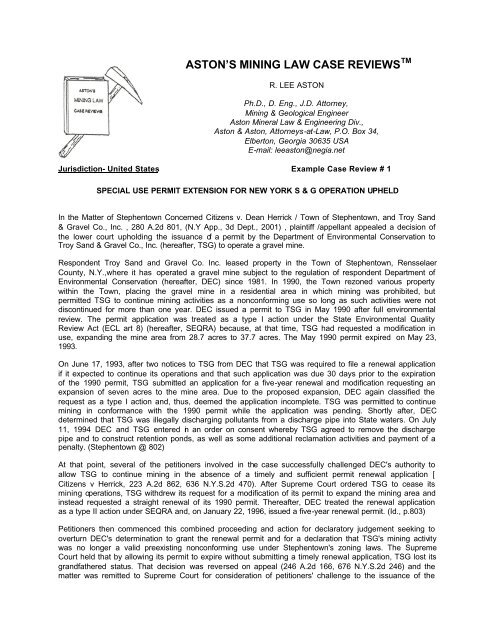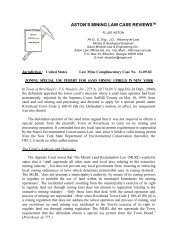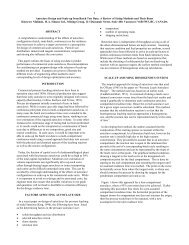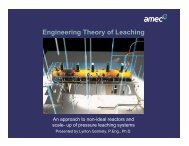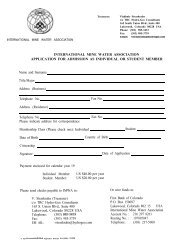Example Case Review No 1.rtf - Technology Solutions for Mining
Example Case Review No 1.rtf - Technology Solutions for Mining
Example Case Review No 1.rtf - Technology Solutions for Mining
- No tags were found...
You also want an ePaper? Increase the reach of your titles
YUMPU automatically turns print PDFs into web optimized ePapers that Google loves.
ASTON’S MINING LAW CASE REVIEWS TMR. LEE ASTONPh.D., D. Eng., J.D. Attorney,<strong>Mining</strong> & Geological EngineerAston Mineral Law & Engineering Div.,Aston & Aston, Attorneys-at-Law, P.O. Box 34,Elberton, Georgia 30635 USAE-mail: leeaston@negia.netJurisdiction- United States <strong>Example</strong> <strong>Case</strong> <strong>Review</strong> # 1SPECIAL USE PERMIT EXTENSION FOR NEW YORK S & G OPERATION UPHELDIn the Matter of Stephentown Concerned Citizens v. Dean Herrick / Town of Stephentown, and Troy Sand& Gravel Co., Inc. , 280 A.2d 801, (N.Y App., 3d Dept., 2001) , plaintiff /appellant appealed a decision ofthe lower court upholding the issuance of a permit by the Department of Environmental Conservation toTroy Sand & Gravel Co., Inc. (hereafter, TSG) to operate a gravel mine.Respondent Troy Sand and Gravel Co. Inc. leased property in the Town of Stephentown, RensselaerCounty, N.Y.,where it has operated a gravel mine subject to the regulation of respondent Department ofEnvironmental Conservation (hereafter, DEC) since 1981. In 1990, the Town rezoned various propertywithin the Town, placing the gravel mine in a residential area in which mining was prohibited, butpermitted TSG to continue mining activities as a noncon<strong>for</strong>ming use so long as such activities were notdiscontinued <strong>for</strong> more than one year. DEC issued a permit to TSG in May 1990 after full environmentalreview. The permit application was treated as a type I action under the State Environmental Quality<strong>Review</strong> Act (ECL art 8) (hereafter, SEQRA) because, at that time, TSG had requested a modification inuse, expanding the mine area from 28.7 acres to 37.7 acres. The May 1990 permit expired on May 23,1993.On June 17, 1993, after two notices to TSG from DEC that TSG was required to file a renewal applicationif it expected to continue its operations and that such application was due 30 days prior to the expirationof the 1990 permit, TSG submitted an application <strong>for</strong> a five-year renewal and modification requesting anexpansion of seven acres to the mine area. Due to the proposed expansion, DEC again classified therequest as a type I action and, thus, deemed the application incomplete. TSG was permitted to continuemining in con<strong>for</strong>mance with the 1990 permit while the application was pending. Shortly after, DECdetermined that TSG was illegally discharging pollutants from a discharge pipe into State waters. On July11, 1994 DEC and TSG entered in an order on consent whereby TSG agreed to remove the dischargepipe and to construct retention ponds, as well as some additional reclamation activities and payment of apenalty. (Stephentown @ 802)At that point, several of the petitioners involved in the case successfully challenged DEC's authority toallow TSG to continue mining in the absence of a timely and sufficient permit renewal application [Citizens v Herrick, 223 A.2d 862, 636 N.Y.S.2d 470). After Supreme Court ordered TSG to cease itsmining operations, TSG withdrew its request <strong>for</strong> a modification of its permit to expand the mining area andinstead requested a straight renewal of its 1990 permit. Thereafter, DEC treated the renewal applicationas a type II action under SEQRA and, on January 22, 1996, issued a five-year renewal permit. (Id., p.803)Petitioners then commenced this combined proceeding and action <strong>for</strong> declaratory judgement seeking tooverturn DEC's determination to grant the renewal permit and <strong>for</strong> a declaration that TSG's mining activitywas no longer a valid preexisting noncon<strong>for</strong>ming use under Stephentown's zoning laws. The SupremeCourt held that by allowing its permit to expire without submitting a timely renewal application, TSG lost itsgrandfathered status. That decision was reversed on appeal (246 A.2d 166, 676 N.Y.S.2d 246) and thematter was remitted to Supreme Court <strong>for</strong> consideration of petitioners' challenge to the issuance of the
1996 permit. The Supreme Court rejected petitioners' arguments and dismissed the petition. Petitionersnow appeal, arguing : (1) that DEC lacked discretion to treat TSG's most recent renewal application as atype II action because it should have been treated as a new application subject to review, as if no priorpermit had ever been issued, in light of its untimeliness; (2) that DEC's determination that the applicationwas a type II action was arbitrary and capricious because the proposed action contemplated significantchanges to the use authorized under the 1990 permit, and (3) that DEC was not authorized to grant a fiveyear permit because, at the time the 1990 permit expired, DEC's regulations authorized only a three-yearmaximum extension.The court noted that, "Although TSG's application <strong>for</strong> renewal was unquestionably late, it is within DEC'sdiscretion either to treat a late application as a new application or to treat it as a renewal request of apreviously authorized action. 6 NYCRR 621.13 [e] [4] states that, 'The department may determine thatany application <strong>for</strong> renewal or modification shall be treated as a new application <strong>for</strong> a permit if ... therenewal application is not timely or sufficient'. Here, although technically the application <strong>for</strong> renewal wasnot submitted until two years following the expiration of the 1990 permit, <strong>for</strong> the majority of that timeTSG's application <strong>for</strong> a modification was pending and it was continuing its operation with DEC's consent.The initial modification request was submitted less than two months past DEC's deadline. Once theSupreme Court ruled that DEC lacked authority to allow TSG to continue its operations under the 1990permit while the modification request was pending, TSG promptly submitted an application <strong>for</strong> renewalwithout the proposed expansion. Under these circumstances, we cannot say that DEC abused itsdiscretion in treating the application as a renewal application. (Id., p.804)The court continued, "Absent some material change in circumstances, a renewal application ordinarily isconsidered a type II action. 'What constitutes a 'material change' in permit conditions ...requiresevaluation of factual data within DEC's expertise and DEC's interpretation is, there<strong>for</strong>e, to be givendeference unless unreasonable; (Matter of Scenic Hudson v Jorling, 183 A.2d at 262). Here, petitionersallege that TSG's construction and use of water retention ponds and its recent reclamation activitiesconstitute a material change from the conditions under which TSG was issued its 1990 permit. Theseactions, however, were all authorized and, indeed, mandated by the 1994 consent order. Thus, theseactions were undertaken pursuant to an order in an en<strong>for</strong>cement proceeding and, as such, are not subjectto SEQRA review. The remaining activities which petitioners allege warrant type I classification - - belowwater table mining and noise created by rock crushing and traffic - - were specifically contemplated at thetime the 1990 permit was issued and, there<strong>for</strong>e, DEC is not required to reconsider the environmentalimpacts of those activities. Accordingly, it was not unreasonable <strong>for</strong> DEC to conclude that there had beenno material change in permit conditions requiring further SEQRA review." (Id. p. 804)The Court rejected the petitioners' contention that the DEC's ruling was arbitrary and capricious ingranting a five-year permit. The Court added, "DEC clearly has the authority to issue a five-year permit.Petitioners argue that because in 1993, when TSG's prior permit expired, the regulation authorized threeyearrenewals rather than the five-year renewal contemplated by the current regulation, and DEC shouldonly have renewed the permit <strong>for</strong> three years. Petitioners provide no persuasive authority <strong>for</strong> theproposition that DEC is required to adhere to the regulation in effect when the <strong>for</strong>mer permit expired,rather than that in effect when the renewal application is granted. Thus, finding nothing unreasonableabout DEC's interpretation, we accord that agency the deference to which it is entitled when interpretingthe regulations that it is charged with en<strong>for</strong>cing." (Id. p.805)TSG's mining permit was approved.


